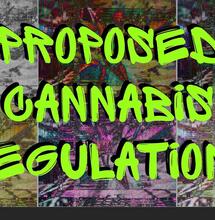Christopher Bucktin: Could legal cannabis reduce alcohol abuse?

Researchers believe the increasing availability of the drug could lead to a decrease in the consumption of alcohol - a far bigger killer both here and in the UK.
Researchers believe the increasing availability of the drug could lead to a decrease in the consumption of alcohol - a far bigger killer both here and in the UK.
For the record I have no desire to smoke marijuana. It's not because I'm a staunch anti-drugs campaigner, it is just my days of trying to be cool (not that I ever was) are long gone.
Nonetheless, I have come to believe that the UK should follow the lead America is showing to legalise its use.
The States is no stranger to the notion of cannabis for all.
It flirted with the idea as far back as 1976 when Jimmy Carter supported decriminalisation in his election campaign.
Only when his chief drug tsar was reported to have used cocaine at a party close to the White House was the notion quietly stubbed out.
However, almost four decades later, a pot renaissance is sweeping America with 17 states and the nation's capital allowing the use of medical marijuana with a doctor's note - which in some places is ludicrously easy to get.
A further 13 states have decriminalised the drug allowing those caught in possession to be hit with a relatively paltry fine instead of becoming another inmate in the already overcrowded prison system.
But two western states have taken the next step.
Colorado and Washington have voted to make cannabis legal for anyone 21 or older.
The approval marked a historic change - and the emergence of a huge new industry to rival those for cigarettes and alcohol.
A recent poll found for the first time more than half of Americans - 58 per cent in fact - think marijuana should be legal while 40 years ago the figure stood at just 12 per cent.
And while fewer than one-third of voters, 65 and older, favour legalised pot, the number increases to almost two-thirds among voters 18 to 29-year-olds.
Cannabis has been in use for thousands of years and has, to my knowledge, not been directly responsible for a single death.
But it is not only the economical benefit to its legalisation that Britain could do well from. New positives are already being found.
Researchers here believe the increasing availability of the drug could lead to a decrease in the consumption of alcohol - a far bigger killer both here and in the UK.
The NHS alone shells out more than £3.5bn each year in the treatment of booze-related problems.
Pro campaigners in America point to a recent report that found the legalisation of cannabis for medical purposes has been linked with reductions in heavy drinking, especially among 18 to 29-year-olds, and with an almost five per cent decrease in alcohol sales.
But putting the potential medical benefits to one side, the overriding argument for me is the positive effect it could have on our communities.
The war on drugs has been an utter failure and for me keeping cannabis illegal means its production and profits are in the hands of criminals who often use violence to protect their market share and blight our communities.
Although the worst consequence of prohibition is the sight of thousands of people each and every year being handed criminal records for minor possession that ultimately then makes it difficult to secure a job and therefore leads to a potential life on state benefits.
The current arguments demonstrate how imperfect the current legal regime is both here and in the UK but unless we are brave enough to bring about changes it is the hardworking taxpayer who will see the potential gains go up in smoke.
http://www.manchestereveningnews.co.uk 17/01/2014



